My.Family - Ancestors, Descendants and Others
Person Page 1,527
Elise May Petersen1
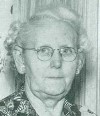
1887-1956
Biography
- Elise May Petersen was born on 27 June 1887 in Smithfield, Utah.1
- Elise married David Allen Pitcher, son of Edward Pitcher and Mary Ann Eldredge, estimated 1907.1,2
- Elise May Petersen died on 22 June 1956 in Cardston, Alberta, Canada, at age 68.1
- She was buried in Cardston Cemetery, Cardston, Alberta, Canada. Plot: Block 10 Lot 31 Plot 11.1
Family: David Allen Pitcher (b. 3 June 1882, d. 30 November 1962)
- Willis Allen Pitcher+ (b. 14 January 1910, d. 25 September 2003)
Other Information
- Last Edited: 17 November 2024 12:15:52
Citations
Willis Allen Pitcher 1
1
- Sargent Lineage: David9, Mary Ann Eldredge8, Ira7, Alanson6, Ann Hanks5, Tabitha Hall4, Ruth Sargent3, John2, John1, William0
Parents
- Father: David Allen Pitcher (b. 3 June 1882, d. 30 November 1962)
- Mother: Elise May Petersen (b. 27 June 1887, d. 22 June 1956)
Biography
- Willis Allen Pitcher was born on 14 January 1910 in Cardston, Alberta, Canada.1
- Willis married Margaret Ethel Caldwell estimated 1935.2,3
- He died on 25 September 2003 in Cardston, Alberta, Canada, at age 93.1
- He was buried in Cardston Cemetery, Cardston, Alberta, Canada. Plot: Block 3, Lot 96, Plot 16.1
 Gravestone
Gravestone
Family: Margaret Ethel Caldwell (b. 23 April 1911, d. 26 April 2001)
- Gladys Charlene Pitcher (b. 17 April 1936, d. 27 May 1999)
Other Information
- Relationship: 8th cousin 1 time removed of Linda Sargent
- Charts/Lists: Descendants of William Sargent, Immigrant
- Last Edited: 19 September 2024 16:46:29
Citations
Margaret Ethel Caldwell1
Biography
- Margaret Ethel Caldwell was born on 23 April 1911 in Claresholm, Alberta, Canada.1
- Father: James Albert Caldwell (b 1868) - Mother: Catherine Emaline Arthur (b 1871.)2
- Margaret married Willis Allen Pitcher, son of David Allen Pitcher and Elise May Petersen, estimated 1935.1,3
- Margaret Ethel Caldwell died on 26 April 2001 in Cardston, Alberta, Canada, at age 90.1
- She was buried in Cardston Cemetery, Cardston, Alberta, Canada.1
 Gravestone
Gravestone
Family: Willis Allen Pitcher (b. 14 January 1910, d. 25 September 2003)
- Gladys Charlene Pitcher (b. 17 April 1936, d. 27 May 1999)
Other Information
- Last Edited: 19 September 2024 16:46:29
Citations
Gladys Charlene Pitcher 1
1
- Sargent Lineage: Willis10, David9, Mary Ann Eldredge8, Ira7, Alanson6, Ann Hanks5, Tabitha Hall4, Ruth Sargent3, John2, John1, William0
Parents
- Father: Willis Allen Pitcher (b. 14 January 1910, d. 25 September 2003)
- Mother: Margaret Ethel Caldwell (b. 23 April 1911, d. 26 April 2001)
Biography
- Gladys Charlene Pitcher was born on 17 April 1936 in Cardston, Alberta, Canada.1
- She died on 27 May 1999 at age 63.1
- She was buried in Cardston Cemetery, Cardston, Alberta, Canada. Plot: Block 10, Lot 31, Plot 7.1
 Gravestone
Gravestone
Other Information
- Relationship: 9th cousin of Linda Sargent
- Charts/Lists: Descendants of William Sargent, Immigrant
- Last Edited: 19 September 2024 16:46:29
Citations
Carrie Lanning 1
1
- Sargent Lineage: Randie13, Norma Jean Kelley12, Irma Priscilla John11, Cora Stillwell Browning Willey10, Ellen Augusta Hopkins9, Elizabeth Augustus Dennis8, Mehitable Dowse Barker7, Rebecca Sewell Burditt6, Samuel5, Thomas4, Mary Sargent3, Joseph2, John1, William0
Parents
- Father: Randie Lanning
- Mother: Leanne Cerqueira Llewellyn
Other Information
- Relationship: 8th cousin 3 times removed of Linda Sargent
- Charts/Lists: Descendants of William Sargent, Immigrant
- Last Edited: 19 September 2024 16:46:29
Citations
Eliza Wilkinson1,2
Biography
- Eliza Wilkinson was born on 23 November 1860 in Micklegate District; York, Yorkshire, England.1,2
- Eliza married John Albert Eldredge, son of Ira Eldredge and Hannah Mariah Savage, about 1879.1
- Eliza Wilkinson appeared on the 1880 US Federal Census of Evanston, Uinta County, Wyoming, enumerated on 22 June 1880, in the household of Hannah Mariah Savage, her mother-in-law and her husband.1
- Eliza listed that she had 8 children only 5 of whom were living by 1900.3
- John Albert Eldredge and Eliza appeared on the 1900 US Federal Census of Center St, Evanston, Uinta County, Wyoming, enumerated on 15 April 1900. They own their home free of mortgage.3
- She died on 11 September 1936 in Evanston, Wyoming, at age 75.2
Family: John Albert Eldredge (b. 22 January 1854, d. 27 October 1925)
- Ira William Eldredge (b. 9 January 1881, d. 8 December 1915)
- Jesse A Eldredge (b. January 1884)
- Frederick G Eldredge (b. April 1886)
- Pearl Eldredge (b. January 1889)
- Clide Eldredge (b. March 1891)
Other Information
- Last Edited: 19 September 2024 16:46:29
Citations
Edman Garn1
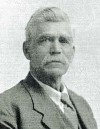
1848-1915
Biography
- Edman Garn was born on 11 December 1848 in Jackson, Ohio.1,2
- Edman married Nancy Mariah Eldredge, daughter of Ira Eldredge and Hannah Mariah Savage, on 22 December 1871 in Hoytsville, Utah.1,2
- They were married by R J Redden, Justice of the Peace.2
- Edman Garn and Nancy appeared in a family photo estimated 1897.3
 The family of Edman Garn
The family of Edman Garn
and Nancy Mariah Eldredge - He died on 2 January 1915 in Imbler, Oregon, at age 66.1,2
- He was buried in Summerville Cemetery, Summerville, Oregon.1
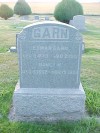 Gravestone
Gravestone
Family: Nancy Mariah Eldredge (b. 5 December 1852, d. 19 November 1937)
- Catherine Marie Garn (b. 4 October 1872, d. 1 November 1963)
- Edman M Garn (b. 19 May 1874, d. 10 March 1876)
- Jesse Monroe Garn+ (b. 25 December 1875, d. 12 August 1957)
- Bertha Belinda Garn+ (b. 4 February 1879, d. 7 January 1957)
- Guy Elmer Garn (b. 27 July 1887, d. 12 April 1973)
Other Information
- Last Edited: 19 September 2024 16:46:29
Citations
Bertha Belinda Garn 1
1
- Sargent Lineage: Nancy Mariah Eldredge8, Ira7, Alanson6, Ann Hanks5, Tabitha Hall4, Ruth Sargent3, John2, John1, William0
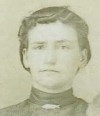
1879-1957
Parents
- Father: Edman Garn (b. 11 December 1848, d. 2 January 1915)
- Mother: Nancy Mariah Eldredge (b. 5 December 1852, d. 19 November 1937)
Biography
- Bertha Belinda Garn was born on 4 February 1879 in Cove, Oregon.1
- Bertha married David Andrew Osborn on 1 June 1898 in Union County, Oregon.1
- She was a published poet and songwriter.1
- She died on 7 January 1957 in La Grande, Oregon, at age 77.1
- She was buried in Summerville Cemetery, Summerville, Oregon.2
 Gravestone
Gravestone - The cause of her death was colon cancer.1
Family: David Andrew Osborn (b. 17 January 1872, d. 29 September 1962)
- Iren La Verne Osborn+ (b. 10 January 1900, d. 9 December 1977)
- David Clinton Osborn+ (b. 19 January 1906, d. 10 May 1991)
- Bonnie Bertha Osborn+ (b. 29 September 1910, d. 20 June 1996)
Story
"She was a Published Poet and Songwriter.
She never trusted banks after the Depression and kept all of her and David's cash "stashed" in different areas of their Rooming House. That Rooming House was located at: 1501 Adams Avenue in LaGrande, Oregon. She kept a "spotless" house and loved to shine the stair banister by sitting on a rag and sliding down...Much to the amusement and delight of all of her Grandchildren.
Bertha, like her mother, Nancy, was definitely the "controlling" fact or in all decisions made by and for the family . Almost all of the financial decisions were made by Bertha.
Bertha grew hard of hearing and used a hearing aid only when it was absolutely necessary. She complained of earaches up until her death.
She died of colon cancer, in January of 1957. ."1
Other Information
- Relationship: 7th cousin 2 times removed of Linda Sargent
- Charts/Lists: Descendants of William Sargent, Immigrant, Musicians
- Last Edited: 19 September 2024 16:46:29
Citations
Catherine Marie Garn 1
1
- Sargent Lineage: Nancy Mariah Eldredge8, Ira7, Alanson6, Ann Hanks5, Tabitha Hall4, Ruth Sargent3, John2, John1, William0
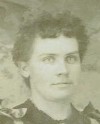
1872-1963
Parents
- Father: Edman Garn (b. 11 December 1848, d. 2 January 1915)
- Mother: Nancy Mariah Eldredge (b. 5 December 1852, d. 19 November 1937)
Biography
- Catherine Marie Garn was born on 4 October 1872 in Coalville, Utah.1
- She appeared in a family photo that was taken estimated 1897.2
 The family of Edman Garn
The family of Edman Garn
and Nancy Mariah Eldredge "Aunt Kate lived in a huge home in Walla Walla, Washington that she had turned into a rooming house.
The family story goes; Her brief marriage to Mr. Murcheson ended when he stole the "egg money" and ran off with another woman. The full details will forever remain a mystery . "
From the WorldConnect Database: "Findleys, Osborns, Garns a nd Holmquists", by RoseLee:.1
- Catherine married Wait Edward Murchison on 25 July 1905 in Union County, Oregon.3
- Catherine and Wait were divorced estimated 1918.3
- She died on 1 November 1963 in Walla Walla, Washington, at age 91.1
- She was buried in Summerville Cemetery, Summerville, Oregon.4
 Gravestone
Gravestone
Family: Wait Edward Murchison (b. 17 March 1878, d. 14 December 1956)
Other Information
- Relationship: 7th cousin 2 times removed of Linda Sargent
- Charts/Lists: Descendants of William Sargent, Immigrant
- Last Edited: 19 September 2024 16:46:29
Citations
Guy Elmer Garn 1
1
- Sargent Lineage: Nancy Mariah Eldredge8, Ira7, Alanson6, Ann Hanks5, Tabitha Hall4, Ruth Sargent3, John2, John1, William0
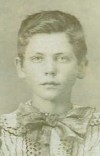
1887-1973
Parents
- Father: Edman Garn (b. 11 December 1848, d. 2 January 1915)
- Mother: Nancy Mariah Eldredge (b. 5 December 1852, d. 19 November 1937)
Biography
- Guy Elmer Garn was born on 27 July 1887 in Cove, Oregon.1
- He appeared in a family photo that was taken estimated 1897.2
 The family of Edman Garn
The family of Edman Garn
and Nancy Mariah Eldredge - Guy married Lucile L (née unknown) Garn about 1915.3
- Guy was a Sgt during WW I.4
- Guy Elmer Garn was a mechanic in a garage.3
- He and Lucile appeared on the 1930 US Federal Census of 814 Elm St, The Dalles, Wasco County, Oregon, enumerated on 2 April 1930. They own their home with an estimated value of $2,000. They also own a radio.3
- He died on 12 April 1973 in The Dalles, Oregon, at age 85.1
- He was buried in Odd Fellows Cemetery, The Dalles, Oregon.4
 Gravestone
Gravestone
Family: Lucile L (née unknown) Garn (b. about 1897)
Other Information
- Relationship: 7th cousin 2 times removed of Linda Sargent
- Charts/Lists: Descendants of William Sargent, Immigrant
- Last Edited: 19 September 2024 16:46:29
Citations
Jesse Monroe Garn 1
1
- Sargent Lineage: Nancy Mariah Eldredge8, Ira7, Alanson6, Ann Hanks5, Tabitha Hall4, Ruth Sargent3, John2, John1, William0
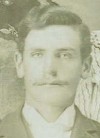
1875-1957
Parents
- Father: Edman Garn (b. 11 December 1848, d. 2 January 1915)
- Mother: Nancy Mariah Eldredge (b. 5 December 1852, d. 19 November 1937)
Biography
- Jesse Monroe Garn was born on 25 December 1875 in Evanston, Wyoming.1
- He appeared in a family photo that was taken estimated 1897.2
 The family of Edman Garn
The family of Edman Garn
and Nancy Mariah Eldredge "Uncle "Roe" lived in a little cabin across the road from t he old Garn place. When I was a small child, we lived on t he Garn place for about a year. I used to sneak across th e road to visit Uncle Roe and he would stuff my pockets ful l of cookies and send me home. "
--from the WorldConnect Database: "Findleys, Osborns, Garns a nd Holmquists", by RoseLee:.1
- Jesse married Carrie Laverne Henry on 25 December 1905 in La Grande, Oregon.1
- Jesse and Carrie were divorced.1
- Jesse married Rosa Belle Coble on 10 March 1918 in Union County, Oregon.2
- He died on 12 August 1957 in La Grande, Oregon, at age 81.1
Family: Carrie Laverne Henry (b. 25 August 1887, d. 8 October 1963)
- Jessie LaVera Garn (b. 15 July 1906, d. 29 January 1999)
Family: Rosa Belle Coble (b. 25 March 1872, d. 4 April 1948)
Other Information
- Relationship: 7th cousin 2 times removed of Linda Sargent
- Charts/Lists: Descendants of William Sargent, Immigrant
- Last Edited: 19 September 2024 16:46:29
Citations
Edman M Garn 1
1
- Sargent Lineage: Nancy Mariah Eldredge8, Ira7, Alanson6, Ann Hanks5, Tabitha Hall4, Ruth Sargent3, John2, John1, William0
Parents
- Father: Edman Garn (b. 11 December 1848, d. 2 January 1915)
- Mother: Nancy Mariah Eldredge (b. 5 December 1852, d. 19 November 1937)
Biography
- Edman M Garn was born on 19 May 1874 in Evanston, Wyoming.1
- He died on 10 March 1876 in Evanston, Wyoming, at age 1.2
Other Information
- Relationship: 7th cousin 2 times removed of Linda Sargent
- Charts/Lists: Descendants of William Sargent, Immigrant
- Last Edited: 19 September 2024 16:46:29
Citations
Carrie Laverne Henry1
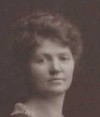
1887-1963
Biography
- Carrie Laverne Henry was born on 25 August 1887 in Manti, Utah.2
- Father: William Henry - Mother: Hannah Westenskow.2
- Carrie was the 2nd daughter, 3rd child of 15 children - 3 boys and 12 girls. All lived to maturity except 1 who died at age 10.1
 Back: Armida, Jessie, Jennie, Laverne, irma, Ethellinda
Back: Armida, Jessie, Jennie, Laverne, irma, Ethellinda
Front: Lenora, Vilate, Hannah Westenskow Henry, Marelda, Helen - She was a member of the LDS Church.2
- Carrie married Jesse Monroe Garn, son of Edman Garn and Nancy Mariah Eldredge, on 25 December 1905 in La Grande, Oregon.2
- Carrie and Jesse were divorced.2
- In April 1910 Carrie married Erastus Henningson. They were later divorced. They had 4 children.2
- On 7 December 1925 Carrie married John Henry Etherington.2
- She died on 8 October 1963 in Pentleton, Oregon, at age 76.2
Family: Jesse Monroe Garn (b. 25 December 1875, d. 12 August 1957)
- Jessie LaVera Garn (b. 15 July 1906, d. 29 January 1999)
Other Information
- Last Edited: 19 September 2024 16:46:29
Citations
Jessie LaVera Garn 1
1
- Sargent Lineage: Jesse9, Nancy Mariah Eldredge8, Ira7, Alanson6, Ann Hanks5, Tabitha Hall4, Ruth Sargent3, John2, John1, William0
Parents
- Father: Jesse Monroe Garn (b. 25 December 1875, d. 12 August 1957)
- Mother: Carrie Laverne Henry (b. 25 August 1887, d. 8 October 1963)
Biography
- Jessie LaVera Garn was born on 15 July 1906 in La Grande, Oregon.1
- At some point Jessie was probably married to Mr Hutchens.1
- She died on 29 January 1999 in La Grande, Oregon, at age 92.1
- She was buried in Summerville Cemetery, Summerville, Oregon.1
 Gravestone
Gravestone
Other Information
- Relationship: 8th cousin 1 time removed of Linda Sargent
- Charts/Lists: Descendants of William Sargent, Immigrant
- Last Edited: 19 September 2024 16:46:29
Citations
Wait Edward Murchison1
Biography
- Wait Edward Murchison was born on 17 March 1878 in Union County, Oregon.1
- Wait married Catherine Marie Garn, daughter of Edman Garn and Nancy Mariah Eldredge, on 25 July 1905 in Union County, Oregon.1
- Wait and Catherine were divorced estimated 1918.1
- He died on 14 December 1956 in Portland, Oregon, at age 78.1
Family: Catherine Marie Garn (b. 4 October 1872, d. 1 November 1963)
Other Information
- Last Edited: 19 September 2024 16:46:29
Citations
Lucile L (née unknown) Garn1
Biography
- Lucile L (née unknown) Garn was born about 1897 in Iowa.1
- Lucile married Guy Elmer Garn, son of Edman Garn and Nancy Mariah Eldredge, about 1915.1
- Guy Elmer Garn and Lucile appeared on the 1930 US Federal Census of 814 Elm St, The Dalles, Wasco County, Oregon, enumerated on 2 April 1930. They own their home with an estimated value of $2,000. They also own a radio.1
Family: Guy Elmer Garn (b. 27 July 1887, d. 12 April 1973)
Other Information
- Last Edited: 19 September 2024 16:46:29
Citations
David Andrew Osborn1
Biography
- David Andrew Osborn was born on 17 January 1872 in Weston, Oregon.1
- Father: Alexander Rogers Osborn - Mother: Satirah Ann McDowell.1
- David married Bertha Belinda Garn, daughter of Edman Garn and Nancy Mariah Eldredge, on 1 June 1898 in Union County, Oregon.1
- David Andrew Osborn was a farmer.1
- He died on 29 September 1962 in Fresno, California, at age 90.1
- He was buried in Summerville Cemetery, Summerville, Oregon.2
 Gravestone
Gravestone
Family: Bertha Belinda Garn (b. 4 February 1879, d. 7 January 1957)
- Iren La Verne Osborn+ (b. 10 January 1900, d. 9 December 1977)
- David Clinton Osborn+ (b. 19 January 1906, d. 10 May 1991)
- Bonnie Bertha Osborn+ (b. 29 September 1910, d. 20 June 1996)
Story
"Bio. of D.A. Osborn
The Centennial History of Oregon, 1811-1912, Gaston, Chicag o, The S.J. Clark Publishing Co., 1912. Vol. ?, page 868.
(transcript)
D.A. OSBORN, who is a representative agriculturist of Umatilla county, was born in that county, January 17, 1872, a son of A.R. and Satirah A. (McDowell) Osborn. The mother wa s born in Ohio but the father was born while his parents were crossing the plains in 1842. They are still living in this state. To them were born ten children, seven of whom yet survive.
D.A. Osborn received a common-school education and remained at home until he was twenty-seven years of age, when he began farming for himself, and has since continued in that o ccupation. He now operates a tract of eight hundred acre s of land and is engaged in general farming.
In 1898 Mr. Osborn married Miss Bertha Garn, who was born in Union county and is a daughter of E. D. and N. M. (Eldredge) Garn. Her father is a native of Ohio and her mother o f Wyoming. The parents came to Oregon in 1879 and located in Union county, where they are still residing. In their family were five children, four of whom are yet living . Mr. and Mrs. Osborn are the parents of three children: Irene L., born January 10, 1900; David C., born January 19 , 1906; and Bonnie B., born September 29, 1910.
In politics Mr. Osborn is a republican and gives much attention to the interests of education, having served as a member of the school board. Mrs. Osborn was reared in the faith of the Methodist Episcopal church. Mr. Osborn is one o f the representative citizens of his county, and all with w hom he comes in contact accord him the highest respect and esteem.
Grandfather was a short, stout man with the bluest eyes I e ver saw. I loved spending time with him, even though we said very little to one another. I was always curious about the little round can he carried in the bib pocket of his overalls. He would take out his very small pocket knife , cut a little piece off the wedge he took from the can, place it in his mouth and chew. He had a look of pure extasy when he started to chew. I finally asked him if I migh t have a piece. He hesitated, grinned and gave me a very small bite. I was sick for hours and gramps was in trouble with grandmother.
The night that he died, instead of telling his son Iren (whom he lived with) "goodnight", he told him "goodbye". Uncle Iren thought nothing of it until a few hours later, when he found his father had passed away.
From the WorldConnect Database: "Findleys, Osborns, Garns a nd Holmquists", by RoseLee:.1
Other Information
- Last Edited: 19 September 2024 16:46:29
Citations
Iren La Verne Osborn 1
1
- Sargent Lineage: Bertha Belinda Garn9, Nancy Mariah Eldredge8, Ira7, Alanson6, Ann Hanks5, Tabitha Hall4, Ruth Sargent3, John2, John1, William0
Parents
- Father: David Andrew Osborn (b. 17 January 1872, d. 29 September 1962)
- Mother: Bertha Belinda Garn (b. 4 February 1879, d. 7 January 1957)
Biography
- Iren La Verne Osborn was born on 10 January 1900 in Umatilla County, Oregon.1
- Iren married Flora Mae Bingaman on 1 January 1921 in La Grande, Oregon.1
- Iren married Hazel A Friend on 31 May 1954 in Fresno, California.2
- He died on 9 December 1977 in Madera, California, at age 77.1
Family: Flora Mae Bingaman (b. about 1903)
- Aloha Marie Osborn+ (b. 17 December 1923)
- Charles Warren Osborn+ (b. 5 October 1929, d. 4 July 2001)
Family: Hazel A Friend (b. about 1905)
Story
"Times were difficult and Iren and his younger brother David knew they had to find work. They heard of an opportunity to join a crew of lumberjacks and although their knowledge of that profession was meager, they jumped at the chance to earn an honest dollar. Almost the entire crew, with the exception of Iren and David were very large Swedes...and as David said.."with strange senses of humor". Iren and David had worked very hard all day on their first day and were both constantly harassed by the rest of the crew because of their short stature and Scotch/Irish backgroud. David pretty much ignored them, but Iren (David referred to him as a "Hot-blooded Irishman".) was not "enjoying the hi-j inx in the least....David KNEW something ominous was going to happen. After supper, served in a large mess hall, Iren and David fell into bed and slept like logs.
The next morning at breakfast, one of the Swedes said something particularly derogatory, about the Osborn brothers, to the rest of the crew, got up from his chair, and walked over to Iren and dumped his breakfast in Iren's lap. At this point, David was shaking in his boots, because he KNEW that Iren was not going to take that sitting down. Then, Iren grinned, stood up, brushed the food from his clothing and picked up the plate. David stood up also..ready to run f r the door. Iren then, with the plate in his hand, strolled over to the offending Swede and unceremoniouslys mashed it on the back of his head, nearly knocking the Swede unconscious. Every Swede in the room rose to their feet. David had taken a small revolver with him when they went to the woods and had it on his person that morning. David immediately grabbed Iren by the shirt, brandished the revolver and drug him out the mess hall door. They literally ran for the hills, leaving all their other belongings in the bunkhouse...never to return... with Iren "sputtering" (as David "put it "), every step of the way.1
Other Information
- Relationship: 8th cousin 1 time removed of Linda Sargent
- Charts/Lists: Descendants of William Sargent, Immigrant, Story List of People
- Last Edited: 9 February 2025 10:58:49
Citations
Flora Mae Bingaman1
Biography
- Flora Mae Bingaman was born about 1903 in Oregon.2
- Flora married Iren La Verne Osborn, son of David Andrew Osborn and Bertha Belinda Garn, on 1 January 1921 in La Grande, Oregon.1
Family: Iren La Verne Osborn (b. 10 January 1900, d. 9 December 1977)
- Aloha Marie Osborn+ (b. 17 December 1923)
- Charles Warren Osborn+ (b. 5 October 1929, d. 4 July 2001)
Other Information
- Last Edited: 19 September 2024 16:46:29
Citations
Aloha Marie Osborn 1
1
- Sargent Lineage: Iren10, Bertha Belinda Garn9, Nancy Mariah Eldredge8, Ira7, Alanson6, Ann Hanks5, Tabitha Hall4, Ruth Sargent3, John2, John1, William0
Parents
- Father: Iren La Verne Osborn (b. 10 January 1900, d. 9 December 1977)
- Mother: Flora Mae Bingaman (b. about 1903)
Biography
- Aloha Marie Osborn was born on 17 December 1923 in La Grande, Oregon.1
Other Information
- Relationship: 9th cousin of Linda Sargent
- Charts/Lists: Descendants of William Sargent, Immigrant
- Last Edited: 19 September 2024 16:46:29
Citations
Robert De Lee Roberts1
Family: Aloha Marie Osborn (b. 17 December 1923)
Other Information
- Last Edited: 19 September 2024 16:46:29
Citations
Drew Roberts 1
1
- Sargent Lineage: Aloha Marie Osborn11, Iren10, Bertha Belinda Garn9, Nancy Mariah Eldredge8, Ira7, Alanson6, Ann Hanks5, Tabitha Hall4, Ruth Sargent3, John2, John1, William0
Parents
- Father: Robert De Lee Roberts
- Mother: Aloha Marie Osborn (b. 17 December 1923)
Family: Denene Cook
Other Information
- Relationship: 9th cousin 1 time removed of Linda Sargent
- Charts/Lists: Descendants of William Sargent, Immigrant
- Last Edited: 16 February 2025 20:51:23
Citations
Eloise Diane Walker1
Other Information
- Last Edited: 19 September 2024 16:46:29
Citations
Brian Doan Roberts 1
1
- Sargent Lineage: Drew12, Aloha Marie Osborn11, Iren10, Bertha Belinda Garn9, Nancy Mariah Eldredge8, Ira7, Alanson6, Ann Hanks5, Tabitha Hall4, Ruth Sargent3, John2, John1, William0
Parents
- Father: Drew Roberts
- Mother: Eloise Diane Walker
Other Information
- Relationship: 9th cousin 2 times removed of Linda Sargent
- Charts/Lists: Descendants of William Sargent, Immigrant
- Last Edited: 19 September 2024 16:46:29
Citations
Raina LaDonna Roberts 1
1
- Sargent Lineage: Drew12, Aloha Marie Osborn11, Iren10, Bertha Belinda Garn9, Nancy Mariah Eldredge8, Ira7, Alanson6, Ann Hanks5, Tabitha Hall4, Ruth Sargent3, John2, John1, William0
Parents
- Father: Drew Roberts
- Mother: Eloise Diane Walker
Family: Michael West
Other Information
- Relationship: 9th cousin 2 times removed of Linda Sargent
- Charts/Lists: Descendants of William Sargent, Immigrant
- Last Edited: 19 September 2024 16:46:29